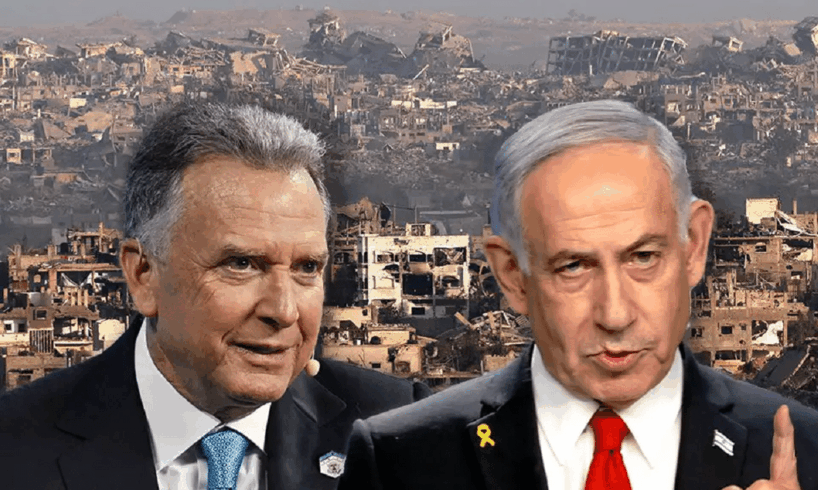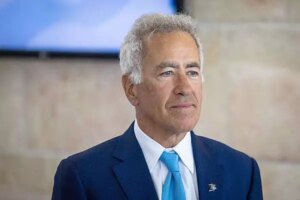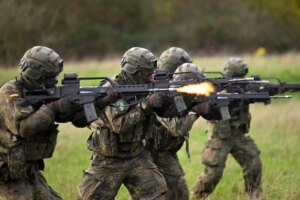
Every successful military campaign requires an accompanying political effort to harvest battlefield victories into lasting strategic gains. Israel and Iran are locked in a battle of titans, where Iran, despite suffering defeats across Lebanon, Syria, Gaza, and Iran itself, continues preventing Israeli political advances through sophisticated Qatari assistance.
Iran’s primary achievement, blocking Israeli-Hamas agreements, compelled Prime Minister Benjamin Netanyahu to return to military solutions, seeking through overwhelming force what diplomacy failed to deliver. Yet this path presents significant political hazards.
Syria, Lebanon and Gaza
Iranian political operations prove less effective in Syria and Lebanon, though the campaign persists. In Syria, Tehran foments tensions between Kurdish and Druze populations against Ahmed al-Sharaa’s (also known as Abu Mohammad al-Julani) unstable government, while supporting remaining ISIS cells and surviving Iranian-backed militias.
Smoke billows following an explosion in central Tehran on June 15, 2025 (Photo: Atta Kenare/AFP)
Lebanon presents different challenges, where Iran struggles to rebuild Hezbollah’s physical capabilities while supporting the organization’s resistance to US demands for complete disarmament.
Gaza remains the most complex arena, primarily due to Hamas’s hostage leverage. Israel Hayom previously exposed Iranian penetration of Hamas leadership that prevented at least two interim agreements promising ceasefire and partial hostage releases.
These proposed agreements included provisions for comprehensive war-ending negotiations – precisely what Iran fears could deliver the political achievements Israel seeks.
Iran exploits Hamas fragmentation
President Donald Trump recently confirmed decisive Iranian involvement. Arab diplomats engaged in negotiations report Iran exploiting the absence of unified Hamas leadership capable of overriding internal disagreements, resulting in position radicalization and betrayal accusations against pragmatic voices.
Recent frameworks for Gaza demilitarization collapsed after Special Envoy to the Middle East Steve Witkoff discussed details with hostage families. Hamas hardliners immediately demanded public denials, which were subsequently issued.
Netanyahu initially supported comprehensive arrangements following Doha negotiations failure, but discussions with Witkoff during his recent visit shifted the prime minister toward offensive operations designed to complete Hamas’s dismantlement as both fighting force and governing authority. A senior diplomatic source identifies this as Netanyahu’s overarching Gaza war objective, prerequisite to considering major political initiatives.
Military occupation without settlement
Addressing newly enlisted armored corps and combat engineering soldiers, the prime minister declared, “These achievements against Iran, Hezbollah and Hamas lie behind us, but completing enemy defeat in Gaza remains essential – liberating all hostages and ensuring Gaza never again threatens Israel. We abandon none of these missions.”
Government hawks advocate full Strip conquest, military administration and Gush Katif reconstruction. Finance Minister Bezalel Smotrich actively promotes this agenda, though Netanyahu currently maintains distance. Political considerations predominate – settlement-oriented conquest would alienate Trump and destroy Abraham Accords expansion prospects. Washington sources indicate potential acceptance of Judea and Samaria sovereignty but strong opposition to Gaza settlement.
Any Gaza control operation would likely proceed under IDF Chief of Staff Lt. Gen. Eyal Zamir’s measured approach – the methodical street-by-street, neighborhood-by-neighborhood clearing adopted since March – rather than rapid armored sweeps through Gaza City, central camps and Deir al-Balah.
International media covers the situation in Gaza (Photo: Israel Hayom)
International patience evaporates
Extended fighting duration minimizes civilian casualties while requiring sustained political battles against increasingly impatient Western leaders. Despite widespread hypocrisy, these leaders have embraced largely fabricated hunger campaigns orchestrated by Hamas and Iran with direct Qatari involvement.
Gaza combat escalation will almost certainly intensify these campaigns and increase pro-Palestinian pressure on governments. European consequences include approaching real measures against Israel – investment restrictions, joint program suspensions like “Horizon,” formal boycotts of Israeli scientists, artists and institutions, plus comprehensive trade and weapons embargos.
Diplomatically, the UN General Assembly convenes in six weeks – the target date chosen by France-Saudi Arabia conference participants for Palestinian state recognition declarations. Continued fighting virtually guarantees additional Western recognition and anti-Israeli UN resolutions.
While the “desolate UN” wields primarily declarative power, the Security Council possesses practical authority. Trump’s America becomes crucial here.
The administration has provided Netanyahu comprehensive support, barring isolated exceptions like tariff disputes. Envoy Witkoff and administration spokesmen consistently blame Hamas and Iran for negotiation failures, while Netanyahu emphasizes complete Washington coordination. This coordination faces imminent testing as Gaza operations proceed.
Trump’s regional calculations
Trump’s circle harbors varying perspectives, influenced by shifting support constituencies, some turning against Israel. White House and State Department assessments suggest Trump will grant Netanyahu operational latitude with international political cover, but intervention becomes likely if operations falter or extend excessively. Netanyahu will comply with presidential directives – this generates minimal debate.
President Donald Trump waves while boarding Air Force One at Lehigh Valley International Airport, Sunday, Aug. 3, 2025, in Allentown, Pa. (Photo: Julia Demaree Nikhinson/AP)
One American diplomatic source suggests Washington-Jerusalem coordination in applying maximum military pressure to return Hamas to negotiations, ending the conflict diplomatically rather than militarily. Operational commencement followed by rapid negotiation resumption would not surprise observers.
Trump seeks rapid Middle East vision implementation, recognizing Hamas and Iran as primary obstacles alongside Gulf states led by Saudi Arabia. Arab nations universally pressure Hamas – Jordan and Egypt maintain direct conflicts while Qatar, despite providing propaganda support, endorsed disarmament demands.
Israeli offensive operations gain US and Gulf approval if they terminate fighting through agreements while eliminating Hamas from power calculations. However, Iranian-inspired Hamas may choose continued resistance, hoping to trigger Israeli external political crises and internal political turmoil forcing cessation and acceptance of hostage release and war termination conditions.





